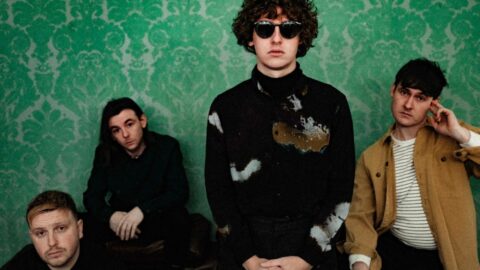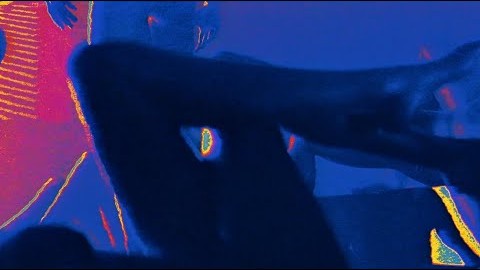NME Music News, Reviews, Videos, Galleries, Tickets and Blogs | NME.COM

Festival culture is full of traditions; the days spent surviving on warm beer and soggy chips, cramming into tents for secret sets and, of course, the annual rite of passage of teenagers celebrating exam results fuelled by cheap booze. While those might make you yearn for summers spent in fields, there’s another, less positive occurrence that’s threatening to join them; the annual furore around line-ups’ lack of non-male artists.
You’ve seen the posters – the bills with every male act removed, leaving huge chasms of space and a cluster of names grouped towards the bottom. They’re met with a despair by gig-goers on social media and fuming opinion pieces, as both fans and journalists ask; ‘where the fuck are the female headliners?’
Festival organisers offer wobbly defences, often peddling the myth that there aren’t enough talented non-male musicians to book. It’s not just festivals who fall back to shifting the blame. In 2018 Grammys boss Neil Portnow said that women needed to “step-up” to win major awards. Festival season comes and goes for another year and the whole cycle begins again.
It seems to come earlier every year. With their 2020 festival cancelled, Reading & Leeds announced the line-up for next August’s edition which included six male headliners, despite the increased number of top spots on the bill. But it’s a widespread problem across some of the UK’s biggest weekenders. As well as the twin festivals, TRNSMT (and, before it, T In The Park), Wireless, Download and more have all come under fire for male-dominated bookings. When the conversation around the issue is so noisy, why aren’t festivals listening?
Despite these yearly backlashes, tickets for these events still sell well, giving the impression that better gender representation on bills might make people angry but won’t stop them from shelling out to attend. “If it sells out and they make money, they’re not going to change their equation,” says George Gargan, founder of London indie label Damnably Records. He and partner Janet Li say they’ve emailed “most of the large festival bookers for a decade” in a bid to get their (typically female) acts booked, but rarely receive a response.
Gargan suggests that change will only come if festivals’ sponsors, the media covering them or the bands approached to play refuse to get involved. “If they don’t see those [booking] habits as problematic, there’s no incentive to do it any other way,” agrees Li. “They see it purely as a financial reason, not political. It’s just business to them. But it’s clear in a lot of entertainment industries that there is financial gain in diversity.”
I can't get over this, reading festival line-up announcement vs. the women on the line-up
pic.twitter.com/dTiBTsLa2X
— lauren
(@Laurenlouise_01) August 31, 2020
Music fan Kameron McIntyre, rejects the idea that female artists aren’t ‘profitable’. After all, Billie Eilish had one of the biggest crowds in the festival’s history at Reading 2019, while Dua Lipa is the most streamed female artist on Spotify and only fourth below The Weeknd, Drake and J Balvin, at the time of writing.
He reels off a list of stars – from top names like Beyoncé and Lady Gaga to mid-tier artists like Jorja Smith and Jessie Ware – and suggests there could even be a market for an all-female line-up, like a modern-day Lilith Fair. “It’s very rare that you’ll see a Top 10 [in the charts] without women in so there’s no doubt the music industry is making so much money from women,” he reasons. “It’s only right when it comes to festivals and live music that women should be at the forefront. They should get an equal chance to perform.”
Emma Banks, co-head booking agancy CAA’s London office and agent for the likes of Lorde and Green Day, has done her own research into the gender balance of artists playing at venues across the UK, noting that these spaces are dictated by “market forces” and give a picture of acts’ “relative selling power” that festivals can use to gauge their bankability.
“Over the last five years, not one of the venues I spoke to – all 5,000 capacity and above in London – had a year where there were more than 25 percent female artists or female-led bands playing as the headliner,” she explains. “Keep in mind that one of these was The O2 where there would be some major pop artists playing and they are unlikely to play most of the festivals in the UK and Europe, so it puts some perspective as to where we are at.”
She adds that, for any promoter, there’s a huge risk in putting on a festival, with organisers of large events taking on costs “in the multi-millions”. “On a festival of 60,000 capacity, it’s probably the last 10,000 tickets (and maybe less) that are the difference between making money and losing a lot of money,” she says. “Festivals are very aware of trying to balance a bill musically and with regard to diversity, but they can only book those artists that are available and that want to play.”
The events of this year present a new challenge for festivals’ solvency. With the coronavirus pandemic wiping out business this summer and beyond, it’s more important than ever that line-ups are able to recoup those costs for promoters. Despite that setback, Francine Gorman, Pledge Coordinator of Keychange – an international campaign for gender equality on festival line-ups and in the music industry as a whole – says that over 130 festivals they work with don’t see it affecting their progress (Festival Republic have not signed up to the pledge, but instead launched their own project Re:Balance in 2017).
“We’ve done a big survey of all the festivals that we have involved in the project and 95 percent of them have said they don’t think it’s going to affect their commitment,” she says, adding that the other five percent are festivals that might not be able to go ahead in 2021. “There’s no reason why people shouldn’t be able to reach a gender balance. The talent is available and the conversation is extremely loud. We’re planning on making sure that it remains loud for the coming years.”

Programmes like Keychange expose the fact that, while more non-male people are taking up positions in the music industry, it’s still mostly populated by men and the project’s manifesto cites the workforce as being 70 percent male. Banks acknowledges this to be true, but says she’s not sure that stops them from booking women. “Pretty much everyone in live music is in the job because of the love of music [so] the gender of the person making the music would generally not be a factor in my opinion.”
Glastonbury boss Emily Eavis, however, has spoken about her experiences with the festival’s booking team not getting the need for gender-balanced line-ups since she started to push the festival towards that goal. “The thing about the men who book [our] stages, quite a lot of them are old men,” she said at last year’s Annie Mac Presents conference. “They don’t understand why I am pushing them the whole time.” She described the connections between bookers and agents as something of a boys’ club, going for pints, golf days and football trips together. “There’s a whole brotherhood which is so tight,” she explained. “It’s impenetrable.”
Like Glastonbury’s initial bill for 2020, European festivals like Spain’s Primavera and Norway’s Øya have already achieved a gender-balanced line-up. Although the conversation might make it seem as though the UK is far behind those on the continent, Gorman says that’s not the case. “A lot of UK festivals are achieving a really good gender balance,” she says.
One such festival is End Of The Road in Devon, who say their five-year average has seen their bills split 45:55 between female and male performers. Managing Director Lauren Down says that their approach is “very organic” and is largely decided through founder Simon Taffe’s taste. There are other considerations that they have in common with other festivals too.
“It starts early with early conversations with agents and record labels to get a feel for who’s going to be on an album cycle or who’s going to be touring next year,” she explains, also citing the need to “balance the budget”. She notes that while they focus on “equity rather than just equality” and pay attention to how things are shaping up with regards to gender, their method might not work for all festivals.
While Down disputes the idea that there are simply less non-male artists for festivals to book, she does concede the pool of female headliners is smaller than their male counterparts. Instead of just accepting that, though, festivals can remedy it by building opportunities for female talent. “We gave Bat For Lashes her first headline show and Courtney Barnett stepped up in 2019 when Beirut cancelled and was incredible,” she says, pointing to ways smaller festivals can act as a springboard for artists to move on to bigger stages.
“It’s really important that the industry as a whole takes chances and makes things happen. You can get caught up in conversations about exclusives and who’s available – and that is a huge factor – but it’s super important to think about giving those opportunities where you can.” Making headliners doesn’t start and end with promoting an act directly to the top spot though – it can be a process that happens gradually over years, as artists are given new chances higher and higher up bills.

In the meantime, other acts can take change into their own hands and demand better representation. Earlier this year, The 1975’s Matty Healy pledged that the band would not perform at any festival that didn’t have a certain percentage of women or non-binary performers on its bill.
“We need allies in this conversation,” says Gorman. “We need male bands to stand up for their colleagues. People like Matty are extremely important in this conversation and we need way more of our male headliners to take that same stance.” Additionally, she says the Keychange team are speaking to booking agents about how best to make sure their artists are playing on gender-balanced bills.
Starting the conversation around women’s place in music early on could also help, according to Hannah Smith, who fronts Leeds band Dactylion as well as working in education. “I was very lucky in that I grew up in a very musical family and had very good music teachers, but they always invited me to come to choir and never asked me if I wanted to be in the school band,” she says.
“Music needs to start being taken more seriously as a career not just for women but for everyone, and there needs to be a much better effort to make sure women don’t feel like they have to choose a career – or even a hobby – based on what their gender is.”
Banks, meanwhile, suggests fans have a lot of power in changing the make-up of festival line-ups. “While we can ask, cajole and beg festivals to book more females, let’s make it impossible for them to not book those artists by supporting their shows, streaming their music and generally making it a no-brainer for them to get booked without discussion,” she says.
Perhaps in the not-too-distant future, celebrating line-ups with a healthy allotment of non-male artists from top to bottom will be another festival tradition we can all enjoy.
The post Where are all the female headliners? Festival bookers, bands and fans weigh in on how to change the narrative appeared first on NME Music News, Reviews, Videos, Galleries, Tickets and Blogs | NME.COM.




